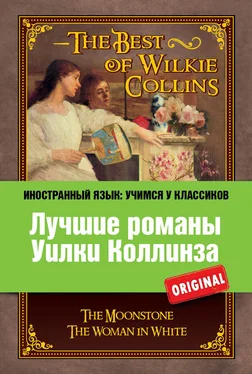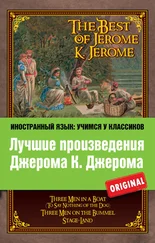Time was now of the last importance.
The news of my being free on bail would reach Sir Percival, to an absolute certainty, before night. If the next few hours did not put me in a position to justify his worst fears, and to hold him helpless at my mercy, I might lose every inch of the ground I had gained, never to recover it again. The unscrupulous nature of the man, the local influence he possessed, the desperate peril of exposure with which my blindfold inquiries threatened him – all warned me to press on to positive discovery, without the useless waste of a single minute. I had found time to think while I was waiting for Mr. Dawson’s arrival, and I had well employed it. Certain portions of the conversation of the talkative old clerk, which had wearied me at the time, now recurred to my memory with a new significance, and a suspicion crossed my mind darkly which had not occurred to me while I was in the vestry. On my way to Knowlesbury, I had only proposed to apply to Mr. Wansborough for information on the subject of Sir Percival’s mother. My object now was to examine the duplicate register of Old Welmingham Church.
Mr. Wansborough was in his office when I inquired for him.
He was a jovial, red-faced, easy-looking man – more like a country squire than a lawyer – and he seemed to be both surprised and amused by my application. He had heard of his father’s copy of the register, but had not even seen it himself. It had never been inquired after, and it was no doubt in the strong room among other papers that had not been disturbed since his father’s death. It was a pity (Mr. Wansborough said) that the old gentleman was not alive to hear his precious copy asked for at last. He would have ridden his favourite hobby harder than ever now. How had I come to hear of the copy? was it through anybody in the town?
I parried the question as well as I could. It was impossible at this stage of the investigation to be too cautious, and it was just as well not to let Mr. Wansborough know prematurely that I had already examined the original register. I described myself, therefore, as pursuing a family inquiry, to the object of which every possible saving of time was of great importance. I was anxious to send certain particulars to London by that day’s post, and one look at the duplicate register (paying, of course, the necessary fees) might supply what I required, and save me a further journey to Old Welmingham. I added that, in the event of my subsequently requiring a copy of the original register, I should make application to Mr. Wansborough’s office to furnish me with the document.
After this explanation no objection was made to producing the copy. A clerk was sent to the strong room, and after some delay returned with the volume. It was of exactly the same size as the volume in the vestry, the only difference being that the copy was more smartly bound. I took it with me to an unoccupied desk. My hands were trembling – my head was burning hot – I felt the necessity of concealing my agitation as well as I could from the persons about me in the room, before I ventured on opening the book.
On the blank page at the beginning, to which I first turned, were traced some lines in faded ink. They contained these words —
“Copy of the Marriage Register of Welmingham Parish Church. Executed under my orders, and afterwards compared, entry by entry, with the original, by myself. (Signed) Robert Wansborough, vestry-clerk.” Below this note there was a line added, in another handwriting, as follows: “Extending from the first of January, 1800, to the thirtieth of June, 1815.”
I turned to the month of September, eighteen hundred and three. I found the marriage of the man whose Christian name was the same as my own. I found the double register of the marriages of the two brothers. And between these entries, at the bottom of the page?
Nothing! Not a vestige of the entry which recorded the marriage of Sir Felix Glyde and Cecilia Jane Elster in the register of the church!
My heart gave a great bound, and throbbed as if it would stifle me. I looked again – I was afraid to believe the evidence of my own eyes. No! not a doubt. The marriage was not there. The entries on the copy occupied exactly the same places on the page as the entries in the original. The last entry on one page recorded the marriage of the man with my Christian name. Below it there was a blank space – a space evidently left because it was too narrow to contain the entry of the marriages of the two brothers, which in the copy, as in the original, occupied the top of the next page. That space told the whole story! There it must have remained in the church register from eighteen hundred and three (when the marriages had been solemnised and the copy had been made) to eighteen hundred and twenty-seven, when Sir Percival appeared at Old Welmingham. Here, at Knowlesbury, was the chance of committing the forgery shown to me in the copy, and there, at Old Welmingham, was the forgery committed in the register of the church.
My head turned giddy – I held by the desk to keep myself from falling. Of all the suspicions which had struck me in relation to that desperate man, not one had been near the truth.
The idea that he was not Sir Percival Glyde at all, that he had no more claim to the baronetcy and to Blackwater Park than the poorest labourer who worked on the estate, had never once occurred to my mind. At one time I had thought he might be Anne Catherick’s father – at another time I had thought he might have been Anne Catherick’s husband – the offence of which he was really guilty had been, from first to last, beyond the widest reach of my imagination.
The paltry means by which the fraud had been effected, the magnitude and daring of the crime that it represented, the horror of the consequences involved in its discovery, overwhelmed me. Who could wonder now at the brute-restlessness of the wretch’s life – at his desperate alternations between abject duplicity and reckless violence – at the madness of guilty distrust which had made him imprison Anne Catherick in the Asylum, and had given him over to the vile conspiracy against his wife, on the bare suspicion that the one and the other knew his terrible secret? The disclosure of that secret might, in past years, have hanged him – might now transport him for life. The disclosure of that secret, even if the sufferers by his deception spared him the penalties of the law, would deprive him at one blow of the name, the rank, the estate, the whole social existence that he had usurped. This was the Secret, and it was mine! A word from me, and house, lands, baronetcy, were gone from him for ever – a word from me, and he was driven out into the world, a nameless, penniless, friendless outcast! The man’s whole future hung on my lips – and he knew it by this time as certainly as I did!
That last thought steadied me. Interests far more precious than my own depended on the caution which must now guide my slightest actions. There was no possible treachery which Sir Percival might not attempt against me. In the danger and desperation of his position he would be staggered by no risks, he would recoil at no crime – he would literally hesitate at nothing to save himself.
I considered for a minute. My first necessity was to secure positive evidence in writing of the discovery that I had just made, and in the event of any personal misadventure happening to me, to place that evidence beyond Sir Percival’s reach. The copy of the register was sure to be safe in Mr. Wansborough’s strong room. But the position of the original in the vestry was, as I had seen with my own eyes, anything but secure.
In this emergency I resolved to return to the church, to apply again to the clerk, and to take the necessary extract from the register before I slept that night. I was not then aware that a legally-certified copy was necessary, and that no document merely drawn out by myself could claim the proper importance as a proof. I was not aware of this, and my determination to keep my present proceedings a secret prevented me from asking any questions which might have procured the necessary information. My one anxiety was the anxiety to get back to Old Welmingham. I made the best excuses I could for the discomposure in my face and manner which Mr. Wansborough had already noticed, laid the necessary fee on his table, arranged that I should write to him in a day or two, and left the office, with my head in a whirl and my blood throbbing through my veins at fever heat.
Читать дальше
Конец ознакомительного отрывка
Купить книгу












